英语中的倒装句
英语语法 倒装句有哪些常见的类型
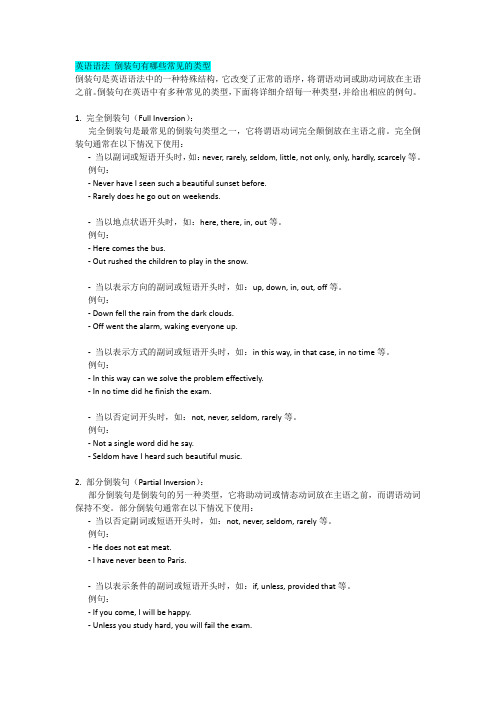
英语语法倒装句有哪些常见的类型倒装句是英语语法中的一种特殊结构,它改变了正常的语序,将谓语动词或助动词放在主语之前。
倒装句在英语中有多种常见的类型,下面将详细介绍每一种类型,并给出相应的例句。
1. 完全倒装句(Full Inversion):完全倒装句是最常见的倒装句类型之一,它将谓语动词完全颠倒放在主语之前。
完全倒装句通常在以下情况下使用:-当以副词或短语开头时,如:never, rarely, seldom, little, not only, only, hardly, scarcely等。
例句:- Never have I seen such a beautiful sunset before.- Rarely does he go out on weekends.-当以地点状语开头时,如:here, there, in, out等。
例句:- Here comes the bus.- Out rushed the children to play in the snow.-当以表示方向的副词或短语开头时,如:up, down, in, out, off等。
例句:- Down fell the rain from the dark clouds.- Off went the alarm, waking everyone up.-当以表示方式的副词或短语开头时,如:in this way, in that case, in no time等。
例句:- In this way can we solve the problem effectively.- In no time did he finish the exam.-当以否定词开头时,如:not, never, seldom, rarely等。
例句:- Not a single word did he say.- Seldom have I heard such beautiful music.2. 部分倒装句(Partial Inversion):部分倒装句是倒装句的另一种类型,它将助动词或情态动词放在主语之前,而谓语动词保持不变。
英语倒装句的归纳总结
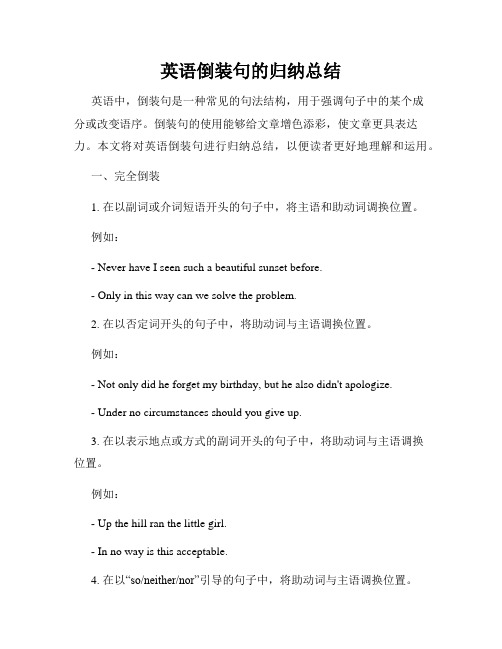
英语倒装句的归纳总结英语中,倒装句是一种常见的句法结构,用于强调句子中的某个成分或改变语序。
倒装句的使用能够给文章增色添彩,使文章更具表达力。
本文将对英语倒装句进行归纳总结,以便读者更好地理解和运用。
一、完全倒装1. 在以副词或介词短语开头的句子中,将主语和助动词调换位置。
例如:- Never have I seen such a beautiful sunset before.- Only in this way can we solve the problem.2. 在以否定词开头的句子中,将助动词与主语调换位置。
例如:- Not only did he forget my birthday, but he also didn't apologize.- Under no circumstances should you give up.3. 在以表示地点或方式的副词开头的句子中,将助动词与主语调换位置。
例如:- Up the hill ran the little girl.- In no way is this acceptable.4. 在以“so/neither/nor”引导的句子中,将助动词与主语调换位置。
例如:- So beautiful is the scenery that it takes my breath away.- Neither have I finished my homework, nor has my brother.二、部分倒装1. 在以“if/whether”引导的条件句中。
例如:- If you work hard, you will achieve your goals.- Whether he comes or not, we will have the party.2. 在以“so that/such that”引导的结果状语从句中。
例如:- He spoke so quickly that I couldn't catch up with him.- The problem is such that it requires a professional to solve it.3. 在以“as/though”引导的方式状语从句中。
倒装句的特点和用法

倒装句的特点和用法倒装句是英语语法中的一种特殊用法,它的特点是将句子中的主语和谓语动词的位置颠倒。
倒装句在英语中应用广泛,能够增加句子的多样性和表达的灵活性。
本文将详细介绍倒装句的特点和用法。
一、倒装句的特点倒装句是指将谓语动词调到主语之前的句子结构。
在倒装句中,主语和谓语动词的位置颠倒,这是倒装句的核心特点。
通常情况下,英语中使用倒装句主要有以下三种情况:1.全倒装:句子的完全倒装,即将助动词或情态动词放在主语之前。
例如:- Never have I seen such a beautiful sunset before.(我以前从未见过如此美丽的日落。
)- Rarely does she complain about her job.(她很少抱怨工作。
)2.部分倒装:句子中只有部分的倒装。
这种倒装通常出现在以否定词开头的句子中,或者是以表示方位、时间的副词或介词短语开头的句子中。
例如:- Not only does she speak French, but she also speaks Spanish.(她不仅会说法语,而且还会说西班牙语。
)- In front of the house stands a tall oak tree.(房子前面矗立着一棵高大的橡树。
)3.省略倒装:句子中的主语没有明确表示,而是通过上下文隐含或省略。
例如:- Only when he arrived did I realize that I forgot to bring my wallet.(直到他到达我才意识到我忘记带钱包。
)二、倒装句的用法倒装句的用法主要包括以下几种情况:1.在以“so/neither/nor”开头的句子中,表示某种情况与前文句子一致。
例如:- Tom can play the guitar, and so can his brother.(汤姆会弹吉他,他的兄弟也会。
)2.在以“only/never/not until”开头的句子中,强调否定或仅限于某种情况。
英语语法 什么是倒装句

英语语法什么是倒装句倒装句是一种特殊的语法结构,在英语语法中有着重要的地位。
正常语序中,主语通常出现在动词之前,而倒装句则将动词或助动词置于主语之前,或者将整个谓语或短语置于主语之前。
这种颠倒的语序在英语中具有特殊的语法和修辞效果,常用于强调、疑问、条件句等语境中。
以下是倒装句的几种常见形式和用法:1. 完全倒装:将助动词或系动词放在主语之前。
例如:- Never have I seen such a beautiful sunset.- Only in dreams can we truly fly.2. 部分倒装:将助动词、情态动词或动词的某些部分放在主语之前。
例如:- Hardly had he arrived when the phone rang.- Not only did she finish the report, but she also submitted it early.3. 带有否定词的倒装:将否定词放在句首,然后倒装动词和主语的顺序。
例如:- Never have I felt so alone.- Not until the rain stopped did they go outside.4. 疑问倒装:将助动词或情态动词提到句首,以形成疑问句。
例如:- Is he coming to the party?- Can you speak French?5. 条件句中的倒装:当条件句以介词短语或副词短语开头时,常常使用倒装结构。
例如:- In case of fire, break the glass.- Should you need any assistance, please let us know.倒装句的使用可以使句子更具有强调和修辞效果,增加句子的变化和多样性。
但需要注意的是,倒装句的使用需要根据具体的语境和句子结构来判断,不是所有情况下都适用。
因此,在使用倒装句时,需要注意语法规则和语义逻辑的准确性。
英语倒装句12种类型及例句
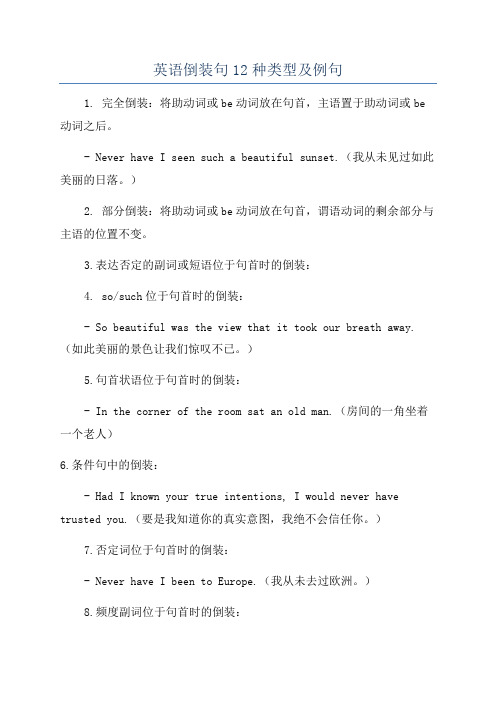
英语倒装句12种类型及例句1. 完全倒装:将助动词或be动词放在句首,主语置于助动词或be 动词之后。
- Never have I seen such a beautiful sunset.(我从未见过如此美丽的日落。
)2. 部分倒装:将助动词或be动词放在句首,谓语动词的剩余部分与主语的位置不变。
3.表达否定的副词或短语位于句首时的倒装:4. so/such位于句首时的倒装:- So beautiful was the view that it took our breath away.(如此美丽的景色让我们惊叹不已。
)5.句首状语位于句首时的倒装:- In the corner of the room sat an old man.(房间的一角坐着一个老人)6.条件句中的倒装:- Had I known your true intentions, I would never have trusted you.(要是我知道你的真实意图,我绝不会信任你。
)7.否定词位于句首时的倒装:- Never have I been to Europe.(我从未去过欧洲。
)8.频度副词位于句首时的倒装:- Rarely do we see such dedication.(我们很少见到如此的奉献精神。
)9.祈使句或祈使句部分的倒装:- Stand up!(站起来!)- Be quiet, please.(请安静。
)10. only位于句首时的倒装:- Only by working hard can you achieve your goals.(只有通过努力工作,你才能实现目标。
)11.地点状语置于句首时的倒装:- In the garden were beautiful flowers.(花园里有美丽的花朵。
)12.宾语置于句首时的倒装:- A love like this I have never felt before.(我之前从未感受过如此的爱。
英语倒装句(最全面_最简洁)
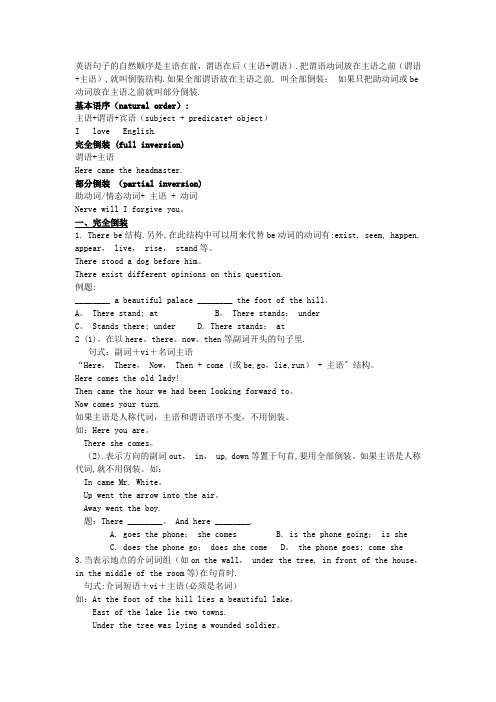
英语句子的自然顺序是主语在前,谓语在后(主语+谓语).把谓语动词放在主语之前(谓语+主语),就叫倒装结构.如果全部谓语放在主语之前, 叫全部倒装;如果只把助动词或be 动词放在主语之前就叫部分倒装.基本语序(natural order):主语+谓语+宾语(subject + predicate+ object)I love English.完全倒装 (full inversion)谓语+主语Here came the headmaster.部分倒装(partial inversion)助动词/情态动词+ 主语 + 动词Nerve will I forgive you。
一、完全倒装1. There be结构.另外,在此结构中可以用来代替be动词的动词有:exist, seem, happen, appear, live, rise, stand等。
There stood a dog before him。
There exist different opinions on this question.例题:________ a beautiful palace ________ the foot of the hill。
A。
There stand; at B。
There stands; underC。
Stands there; under D. There stands; at2 (1)。
在以here、there、now、then等副词开头的句子里.句式:副词+vi+名词主语“Here, There, Now, Then + come (或be,go,lie,run) + 主语" 结构。
Here comes the old lady!Then came the hour we had been looking forward to。
Now comes your turn.如果主语是人称代词,主语和谓语语序不变,不用倒装。
英语倒装句用法经典总结

英语倒装句用法经典总结英语部分倒装用法归纳1.否定副词位于句首时的倒装在正式文体中,never, seldom, rarely, little, hardly, scarcely, no sooner, no longer,nowhere等含有否定意义的副词若位于句首,则其后要用部分倒装:I shall never forgive him. / Never shall I forgive him.我永远不会宽恕他。
XXX XXX. / Seldom does he go out for XXX.他很少出去吃饭。
She hardly has time to listen to music. / Hardly does she have time to listen to music.她几乎没时间听音乐。
XXX is. / Little does he XXX.他不甚明白这个会议的重要性。
XXX.我们刚到机场,飞机就起飞了。
【留意】(1)对于not…until句型,当not until…位于句首时,其后的主句要用倒装语序:He didn’t leave the room until t he rain stopped. / Not until the XXX.雨停了之后他才离开这房间。
(2)某些起副词感化的介词短语,由于含有否认词,若位于句首,厥后要用局部倒装:XXX.这个开关是毫不能触摸的。
In [Under] no circumstances will I lend money to him.无论如何我也不会再借钱给他了。
但是,in no time(立即,马上)位于句首时,其后无需用倒装语序:In no time he worked out the problem.他立时就算出了那道题。
2.“only+状语”位于句首时的倒装当一个状语受副词only的修饰且置于句首时,其后用部分倒装语序:Only then did he realize that he was wrong.到那时他才意识到他错了。
英语倒装句12种类型及例句
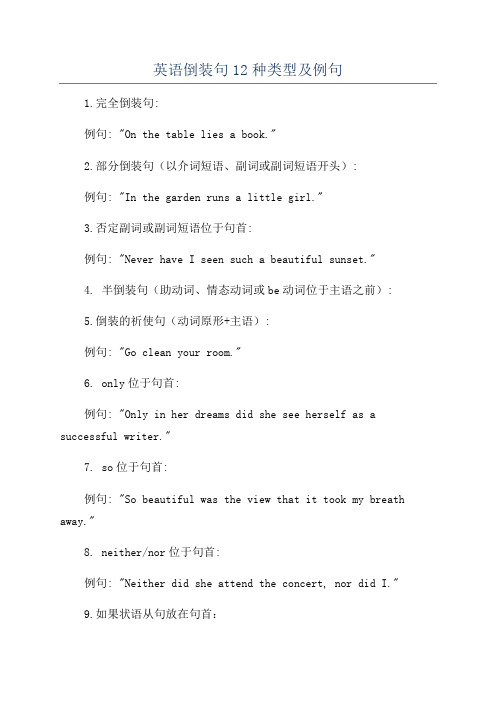
英语倒装句12种类型及例句1.完全倒装句:例句: "On the table lies a book."2.部分倒装句(以介词短语、副词或副词短语开头):例句: "In the garden runs a little girl."3.否定副词或副词短语位于句首:例句: "Never have I seen such a beautiful sunset."4. 半倒装句(助动词、情态动词或be动词位于主语之前):5.倒装的祈使句(动词原形+主语):例句: "Go clean your room."6. only位于句首:例句: "Only in her dreams did she see herself as a successful writer."7. so位于句首:例句: "So beautiful was the view that it took my breath away."8. neither/nor位于句首:例句: "Neither did she attend the concert, nor did I."9.如果状语从句放在句首:10.条件从句位于句首:例句: "Should he fail the exam, he will have to retake the course."11.介词短语或副词短语位于句首:例句: "In the corner sat a small dog."12. or/ nor引导的短语或句子位于句首:。
倒装句的形式和使用
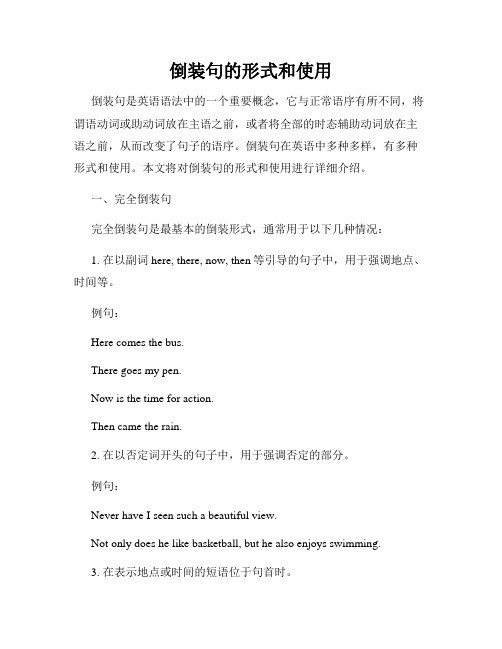
倒装句的形式和使用倒装句是英语语法中的一个重要概念,它与正常语序有所不同,将谓语动词或助动词放在主语之前,或者将全部的时态辅助动词放在主语之前,从而改变了句子的语序。
倒装句在英语中多种多样,有多种形式和使用。
本文将对倒装句的形式和使用进行详细介绍。
一、完全倒装句完全倒装句是最基本的倒装形式,通常用于以下几种情况:1. 在以副词here, there, now, then等引导的句子中,用于强调地点、时间等。
例句:Here comes the bus.There goes my pen.Now is the time for action.Then came the rain.2. 在以否定词开头的句子中,用于强调否定的部分。
例句:Never have I seen such a beautiful view.Not only does he like basketball, but he also enjoys swimming.3. 在表示地点或时间的短语位于句首时。
例句:In the garden stood a tall tree.At the party appeared a famous singer.二、部分倒装句部分倒装句是指将助动词或情态动词放在主语之前,而将主动动词保持不变的倒装形式。
它通常用于以下几种情况:1. 在以否定副词或短语开头的句子中,用于强调否定的部分。
例句:Under no circumstances will I give up.By no means should you ignore his advice.2. 在以only修饰副词、介词短语或状语从句的句子中,用于强调该部分。
例句:Only in this way can we solve the problem.Only by working hard can you achieve success.3. 在以表示“否定”、“否认”、“否则”等词语开头的条件句中。
英语倒装句12种类型
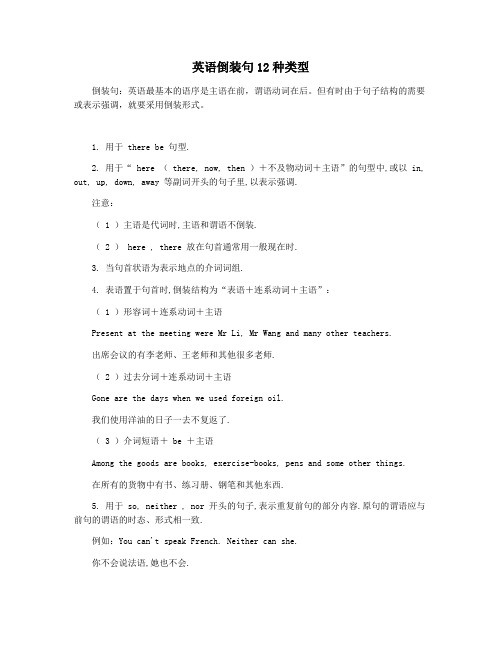
英语倒装句12种类型倒装句:英语最基本的语序是主语在前,谓语动词在后。
但有时由于句子结构的需要或表示强调,就要采用倒装形式。
1. 用于 there be 句型.2. 用于“ here ( there, now, then )+不及物动词+主语”的句型中,或以 in, out, up, down, away 等副词开头的句子里,以表示强调.注意:( 1 )主语是代词时,主语和谓语不倒装.( 2 ) here , there 放在句首通常用一般现在时.3. 当句首状语为表示地点的介词词组.4. 表语置于句首时,倒装结构为“表语+连系动词+主语”:( 1 )形容词+连系动词+主语Present at the meeting were Mr Li, Mr Wang and many other teachers.出席会议的有李老师、王老师和其他很多老师.( 2 )过去分词+连系动词+主语Gone are the days when we used foreign oil.我们使用洋油的日子一去不复返了.( 3 )介词短语+ be +主语Among the goods are books, exercise-books, pens and some other things.在所有的货物中有书、练习册、钢笔和其他东西.5. 用于 so, neither , nor 开头的句子,表示重复前句的部分内容.原句的谓语应与前句的谓语的时态、形式相一致.例如:You can't speak French. Neither can she.你不会说法语,她也不会.6. 为了保持句子平衡,或为了强调表语或状语,或是上下文紧密衔接时.例如: They arrived at a small village, in front of which was a big river.他们来到一个小村庄,村庄前面是条大河.1. 否定副词位于句首时的倒装在正式文体中,never, seldom, rarely, little, hardly, scarcely, no sooner, no longer, nowhere 等含有否定意义的副词若位于句首,则其后要用部分倒装:I shall never forgive him. / Never shall I forgive him. 我永远不会宽恕他。
英语倒装句结构

英语倒装句结构英语句子表达的基本语序是“主语+谓语”。
但在实际应用中,因语法结构的需要,或是为了强调,常把谓语移到主语之前,称为倒装。
英语的倒装结构有两种,其中较为常见的是部分倒装,即谓语的一部分移到主语之前。
如:Only when the war was over could he begin to work again.只有在战争结束后他才能够重新开始工作。
另一种倒装是完全倒装结构,即把谓语的全部都移到主语之前。
如:1.Here comes the bus.公共汽车来了。
2.“But what the child said is true.” said the father.“可是孩子的话是对的。
”父亲说。
下面详细归纳几种常用的倒装结构。
1、几种常见的部分倒装布局:1.Only+状语或者状语从句放在句首。
如:Only in this way can we improve our English.只有这样,我们才能提高英语水平。
Only after you left did l find this bag.只是在你分开当前我才发觉这只提包。
2.含否定意义并修饰全句的词放在句首。
如:not,little, hardly, scarcely,no more, no longer, in no way, never, seldom, not only, no sooner等等。
如:1)Seldom do I go to work by bus.我很少乘大众汽车上班。
2)Never shall I forget it.我永久不会遗忘这件事。
3)No sooner had I got home than it began to rain.我刚一到家,天就开始下雨。
3.So放在句首,跟在一个肯定句之后,表示前面所述内容也适用于另一人或物。
如:1)l XXX.我喜欢旅行,他也喜欢。
2)Her XXX.她父亲是位医生,她母亲也是。
高中英语知识点归纳倒装句的用法

高中英语知识点归纳倒装句的用法倒装句是英语中的一种常见语法现象,它与一般的语序有所不同。
在倒装句中,谓语动词不再位于句子的中间,而是移到主语之前或状语之前,这种语法结构的运用可以使句子显得更加生动有趣。
下面将对高中英语中常见的倒装句进行归纳总结。
一、完全倒装句完全倒装句是指将助动词、情态动词或系动词放在主语之前,句子的谓语动词则位于主语之后。
完全倒装句的结构为:助动词/情态动词/系动词+主语+谓语动词+其他。
1.助动词完全倒装句助动词包括be动词、have动词和do动词。
当句子以副词here、there或表示方向的副词(如up、down、in、out等)开头时,为了突出地点或方向,可以采用助动词完全倒装的形式。
例如:Here comes the bus.There is a cat under the table.Down came the rain.2.情态动词完全倒装句情态动词包括can、could、may、might、must、shall、should、will、would等。
在表示祝愿、建议、命令等意义时,可以采用完全倒装的形式。
例如:May you have a happy birthday!Should you need any help, feel free to ask.Will you please close the door?3.系动词完全倒装句系动词包括be动词、seem、appear、look、sound等。
在表示位置、方式、状态、主语特征等方面时,可以采用系动词完全倒装的形式。
例如:On the table lies a book.How beautiful the flowers are!Tired as he was, he kept working.二、部分倒装句部分倒装句是指将谓语动词的一部分(通常是助动词或情态动词)与主语之间的位置对调,这种语法结构常见于否定句、选择疑问句和以感叹词开头的句子。
倒装句七种英语结构

倒装句七种英语结构
倒装句是英语语法中的一种特殊结构,常用于强调或表达语气的变化。
以下是七种常见的倒装句结构:
1. 完全倒装:主语与谓语的位置颠倒。
例如:Never have I seen such a beautiful sunset.
2. 部分倒装:将助动词或情态动词与主语的位置颠倒。
例如:Not only does he play basketball well, but he also excels in football.
3. 前置式倒装:将表示地点、时间、方向等的副词或短语放在句首并与谓语的位置颠倒。
例如:In the middle of the room stood
a big table.
4. 介词短语倒装:在表示地点、时间、原因等的介词短语前使用倒装结构。
例如:Under no circumstances should you give up your dream.
5. 句首副词倒装:将表示否定、频率、程度等的副词置于句首并与谓语的位置颠倒。
例如:Seldom have I seen such a beautiful painting.
6. 祈使句倒装:用于祈使句中,将动词与主语位置颠倒。
例如:Never mind, let's try again.
7. 条件句倒装:在条件句中,将“if”与主语的位置颠倒。
例如:Had I known the truth, I would not have gone there.
以上是七种常见的倒装句结构,掌握它们能够更加灵活地运用英
语语法,使语言表达更加生动有力。
英语倒装句语法
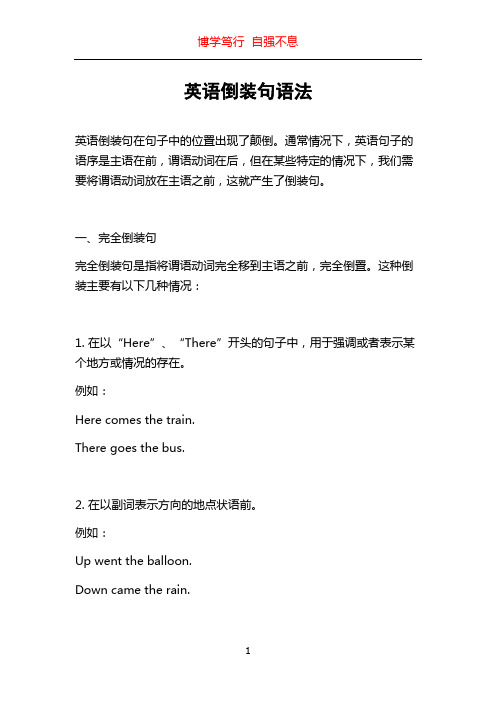
英语倒装句语法英语倒装句在句子中的位置出现了颠倒。
通常情况下,英语句子的语序是主语在前,谓语动词在后,但在某些特定的情况下,我们需要将谓语动词放在主语之前,这就产生了倒装句。
一、完全倒装句完全倒装句是指将谓语动词完全移到主语之前,完全倒置。
这种倒装主要有以下几种情况:1. 在以“Here”、“There”开头的句子中,用于强调或者表示某个地方或情况的存在。
例如:Here comes the train.There goes the bus.2. 在以副词表示方向的地点状语前。
例如:Up went the balloon.Down came the rain.3. 在以“Only+状语”、“Not only+状语”开头的句子中。
例如:Only by working hard can you achieve success.Not only did he pass the exam, but he also got the top score.4. 在以“so/such+形容词/副词+名词”开头表示程度的句子中。
例如:So noisy was the party that I couldn't sleep.Such great progress have we made in science and technology.二、部分倒装句部分倒装是指将助动词或情态动词提到主语之前,而谓语动词仍然保持在主语之后。
这种倒装一般发生在以下几种情况:1. 在以“neither/nor”开头的句子中。
例如:Neither has she seen the movie, nor has she read the book.2. 在以“not+动词”、“no sooner+副词”、“hardly/scarcely+副词”开头的句子中。
例如:Not a single word did he say.No sooner had I arrived than it started to rain.Hardly had he left the house when it started to snow.3. 在以“never/seldom+谓语动词”开头的句子中。
英语倒装金句100句

英语倒装金句100句英语中的倒装句是一种常用的表达方式,它能够使句子更加生动有力。
本文将为您介绍100个常用的英语倒装金句,欢迎阅读。
1. Hardly had I arrived at the station when the train departed.2. Never have I seen such a beautiful sunset.3. Not until she left did I realize how much I missed her.4. Only in this way can we solve the problem effectively.5. Little did he know that his life was about to change forever.6. Under no circumstances should you give up on your dreams.7. Seldom does he express his emotions openly.8. Rarely have I encountered such a challenging task.9. No sooner had the teacher finished speaking than the bell rang.10. In no way am I suggesting that we should ignore the issue.11. At no time during the experiment did the machine malfunction.12. Never before have I felt so alive.13. Only when we are willing to change can we grow.14. Little do they realize the impact of their actions.15. Under no condition should you disclose the confidential information.16. Seldom have I witnessed such dedication and perseverance.17. Rarely do I find the time to relax and enjoy a good book.18. Not until recently did I discover my true passion.19. Only by working together can we achieve our goals.20. Hardly had I begun to speak when she interrupted me.21. Never have I encountered such a difficult problem before.22. Not until tomorrow will they be able to complete the project.23. Only in his presence do I feel truly at ease.24. Little did she suspect that her life was about to change forever.25. Under no circumstances should you give up on your dreams.26. Seldom does he admit that he is wrong.27. Rarely have I seen such a beautiful landscape.28. No sooner had I finished my work than the phone rang.29. In no way am I suggesting that we should ignore the issue.30. At no time during the performance did the audience grow bored.31. Never before have I encountered such a kind-hearted person.32. Only when we face our fears can we overcome them.33. Little do they realize the impact of their words.34. Under no condition should you reveal the password to anyone.35. Seldom have I experienced such a sense of accomplishment.36. Rarely do I have the opportunity to travel abroad.37. Not until he apologized did I forgive him.38. Only by following these steps can you achieve success.39. Hardly had we arrived at the airport when the flight was canceled.40. Never have I seen such a breathtaking view.41. Not until the last moment did she make up her mind.42. Only with your support can we make a difference.43. Little did they know that their lives were about to change forever.44. Under no circumstances should you compromise your values.45. Seldom does he ask for help when he needs it.46. Rarely have I encountered such a challenging task.47. No sooner had I left the house than it started to rain.48. In no way am I suggesting that we should give up.49. At no time during the meeting did the discussion become heated.50. Never before have I felt so inspired.51. Only when we take risks can we achieve great things.52. Little do they understand the complexity of the situation.53. Under no condition should you reveal your personal information.54. Seldom have I encountered such a generous offer.55. Rarely do I have the opportunity to meet such interesting people.56. Not until yesterday did I realize the importance of communication.57. Only by working together can we solve this problem.58. Hardly had I finished my meal when the phone rang.59. Never have I witnessed such dedication.60. Not until the last minute did he change his mind.61. Only through hard work can we achieve our goals.62. Little did she know that her life was about to change forever.63. Under no circumstances should you give up on your dreams.64. Seldom does he talk about his personal life.65. Rarely have I seen such a beautiful sight.66. No sooner had I arrived at the station than the train left.67. In no way am I suggesting that we should ignore the problem.68. At no time during the interview did he mention his previous experience.69. Never before have I felt so inspired.70. Only when we face our fears can we overcome them.71. Little do they realize the impact of their actions.72. Under no condition should you reveal your password.73. Seldom have I witnessed such determination.74. Rarely do I have the opportunity to travel.75. Not until she left did I realize how much I missed her.76. Only by working together can we find a solution.77. Hardly had I finished my work when the power went out.78. Never have I been so impressed by someone's talent.79. Not until the last minute did she decide to go.80. Only with your help can we make a difference.81. Little did they suspect that their lives were about to change forever.82. Under no circumstances should you give up on your dreams.83. Seldom does he take the time to appreciate the beauty around him.84. Rarely have I seen such dedication and commitment.85. No sooner had I started reading the book than I was hooked.86. In no way am I suggesting that we should abandon our principles.87. At no time during the concert did the audience grow bored.88. Never before have I felt so alive.89. Only when we step out of our comfort zone can we grow.90. Little do they realize the impact of their choices.91. Under no condition should you share your passwords with others.92. Seldom have I encountered such a challenging task.93. Rarely do I have the opportunity to meet such interesting people.94. Not until yesterday did I realize how much I loved him.95. Only by working together can we achieve success.96. Hardly had I begun my presentation when the fire alarm went off.97. Never have I seen such a magnificent sight.98. Not until the last moment did she reveal her true feelings.99. Only in this way can we make a difference.100. Little did they know that their lives were about to change forever.以上便是100个常用的英语倒装句金句,它们能够让您的英语表达更加生动有力。
高中英语知识点归纳倒装句的用法及常见情况

高中英语知识点归纳倒装句的用法及常见情况倒装句是英语语法中一个重要的句法结构,它在句子中有特殊的应用。
本文将归纳总结高中英语中关于倒装句的用法及常见情况,以帮助大家更好地理解和运用倒装句。
一、倒装句的基本用法倒装句是指把原本主语和谓语的次序颠倒,使谓语动词或助动词出现在主语之前的一种句法结构。
在英语中,倒装句主要有三种基本形式:全部倒装、部分倒装和助动词倒装。
1. 全部倒装全部倒装是指将整个谓语部分完全颠倒,即将谓语动词或助动词放在主语之前。
常见情况有:在以否定词开头的句子中,当否定副词not,never,hardly,scarcely,little等放在句首时;以及在表示地点、时间或方式的状语从句中。
例1:Not only does he speak English fluently, but he also speaks French.例2:Hardly had I arrived home when it started to rain.例3:In the garden were some beautiful flowers.2. 部分倒装部分倒装是指将助动词,或情态动词,或谓语动词的某些形式移到主语之前。
常见情况包括:带有否定意义的词或短语出现在句首时;含有表示条件的副词或介词短语的句子;以及为了强调某一部分内容。
例4:Never have I seen such a beautiful sunset.例5:Had I known the truth, I would not have told her.例6:Only in this way can we achieve success in our study.3. 助动词倒装助动词倒装是指将助动词提到主语之前,用于疑问句或以so/neither/nor开头的句子,其目的是避免重复。
例7:Do you know him? —— No, I don't.例8:She is reading a book, and so am I.例9:He doesn't like ice cream, and neither do I.二、倒装句的常见情况除了基本的倒装句形式外,倒装句还有一些常见的情况和特殊用法需要掌握。
英语倒装句12种类型
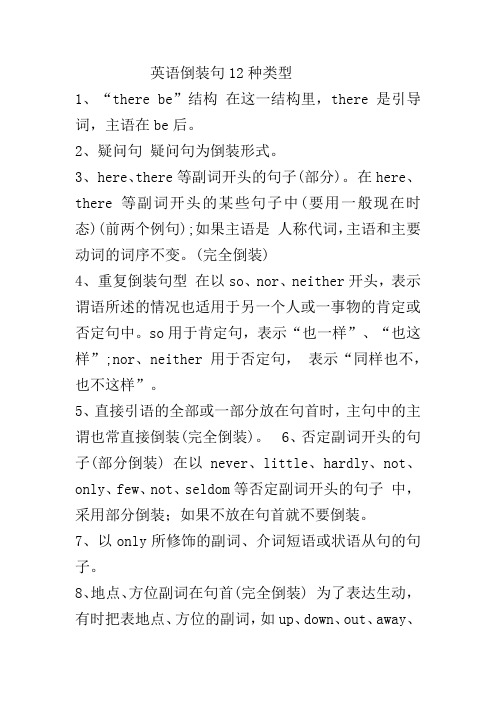
英语倒装句12种类型1、“there be”结构在这一结构里,there是引导词,主语在be后。
2、疑问句疑问句为倒装形式。
3、here、there等副词开头的句子(部分)。
在here、there等副词开头的某些句子中(要用一般现在时态)(前两个例句);如果主语是人称代词,主语和主要动词的词序不变。
(完全倒装)4、重复倒装句型在以so、nor、neither开头,表示谓语所述的情况也适用于另一个人或一事物的肯定或否定句中。
so用于肯定句,表示“也一样”、“也这样”;nor、neither用于否定句,表示“同样也不,也不这样”。
5、直接引语的全部或一部分放在句首时,主句中的主谓也常直接倒装(完全倒装)。
6、否定副词开头的句子(部分倒装) 在以never、little、hardly、not、only、few、not、seldom等否定副词开头的句子中,采用部分倒装;如果不放在句首就不要倒装。
7、以only所修饰的副词、介词短语或状语从句的句子。
8、地点、方位副词在句首(完全倒装) 为了表达生动,有时把表地点、方位的副词,如up、down、out、away、in等放在句首,同时把谓语动词放在主语之前。
若主语为人称代词,主语和谓语动词的位置不变,只将副词放在句首。
(完全倒装)9、虚拟结构中在虚拟结构中,条件从句的谓语含有were、had和should这三个词是,可省去if,将这些词移至主语之前。
10、as引导的让步状语从句 as引导让步状语从句时要倒装(形容词/副词/名词/动词+as+主语+谓语)。
11、祝愿的句子用于某些表示祝愿的句子里。
12、So+形容词、副词及such置于句首时。
英语的倒装句整理归纳

英语的倒装句整理归纳英语倒装句句型的结构有两种:部分倒装和完全倒装。
一、部分倒装部分倒装其实也很简单,我们只需要记住,它完全和疑问句结构一样,要把谓语的一部分(即系动词be;助动词do, have,be, will;情态动词can, must should等)提到主语之前。
Not only is he humorous, but he is also kind to the kids.他不仅幽默,而且对孩子们也很好。
Seldom does the boy eat lamb.这个男孩很少吃羊肉。
Little can we do to help the poor man.我们帮不了这个可怜的人。
部分倒装具体情况:1,否定词never及部分否定词rarely和seldom在句首:Never have I been felt so frustrated!我从来没有这么沮丧过!Seldom has she done anything more foolish.她很少干过比这更愚蠢的事。
注意,句子中往往是完成时态且可能含有比较级。
2,部分否定词hardly, barely, no sooner, or scarcely在句首:No sooner had she got in the bath than the doorbell rang.她刚开始洗澡,门铃响了。
No sooner had we reach the bus station than the bus came.我们一到公共汽车站,公共汽车就来了。
Barely had I closed the door when the phone rang.我刚关上门,电话就响了。
注意,这类句子中一般有先后接连发生的两个动作。
所以从主句多用过去完成时。
3, 部分否定词Little在句首:Little have I read about archeology.我很少读考古学方面的东西。
【语法精讲】 英语倒装句总结,很全面!

语法精讲:英语倒装句总结倒装的种类英语最基本的词序是主语在谓语动词的前面。
如果将句子的主语和谓语完全颠倒过来,这称之为完全倒装。
如果只将助动词或情态动词移至主语之前,谓语的其他部分仍保留在主语的后面,这称之为部分倒装。
一.完全倒装完全倒装是将谓语的全部放在主语之前,此结构通常只用于一般现在时和一般过去时两种。
On her left sat her husband.她左边坐着她丈夫。
Here is the book you want.你要的书在这儿。
Down went the small boat.小船沉下去了。
二.部分倒装部分倒装是指将谓语的一部分,如助动词或情态动词,移至主语之前。
Only by working hard can one succeed.只有努力才能成功。
Never have I seen her before.我以前没见过她。
提示:如果句中的谓语没有助动词或情态动词,则需添加助动词do,does或did,并将其置于主语之前。
Well do I remember the day I joined the League.入团的那一天,我记忆犹新。
Little did I think that he could be back alive.我没有想到他竟能活着回来。
三.常见的倒装结构A.常见的完全倒装结构1.there be句型。
There is a mobile phone and some books on the desk.桌上有一个手机和一些书。
There are thousands of people gathering on the square.广场上聚集着成千上万的人。
注意:引导词there还可以接appear,exist,lie,remain,seem,stand,live等词。
There lived an old fisherman in the village.村里住着一位老渔夫。
什么是倒装句

什么是倒装句?倒装句(Inversion)是英语中的一种语法结构,它改变了正常的主谓语序,将助动词、情态动词或连词放在主语之前,从而使句子的语序倒置。
倒装句在英语中的使用非常常见,可以用于不同的语境和句型中。
下面是倒装句的一些常见用法:1. 完全倒装:在完全倒装句中,助动词、情态动词或连词被放在主语之前,形成倒装结构。
这种倒装常用于以下情况:-在以地点或时间副词开头的句子中,表示强调或突出地点或时间。
-在以表示条件的连词“if”和“unless”引导的句子中。
-在以“so”和“neither”引导的句子中,表示同样的情况或意见。
-在以“not only...but also”引导的句子中,表示并列关系。
- In the corner of the room stood a beautiful piano.(地点副词开头)- If I were you, I would take that job.(条件句倒装)- So does he.(表示同样的情况或意见)- Not only did she study for the exam, but she also helped her classmates.(并列关系)2. 部分倒装:在部分倒装句中,只有助动词或情态动词被放在主语之前,形成倒装结构。
这种倒装常用于以下情况:-在以否定副词或短语开头的句子中,表示强调。
-在以“so”或“neither”引导的句子中,表示同样的情况或意见。
- Never have I seen such a beautiful sunset.(否定副词开头)- So have I.(表示同样的情况或意见)3. 问句倒装:在一般疑问句、特殊疑问句和反意疑问句中,谓语动词和助动词被调换位置,形成倒装结构。
- Did you go to the party last night?(一般疑问句)- What time does the train leave?(特殊疑问句)- You like ice cream, don't you?(反意疑问句)倒装句在英语中的使用非常灵活,可以用于不同的语境和句型中。
- 1、下载文档前请自行甄别文档内容的完整性,平台不提供额外的编辑、内容补充、找答案等附加服务。
- 2、"仅部分预览"的文档,不可在线预览部分如存在完整性等问题,可反馈申请退款(可完整预览的文档不适用该条件!)。
- 3、如文档侵犯您的权益,请联系客服反馈,我们会尽快为您处理(人工客服工作时间:9:00-18:30)。
不加任何冠词。
二、几种常见的完全倒装结构
1.there be句型:有时该句型中也可用其他表示存 在意义的动词代替be。如:live,remain,come, stand,go,lie,exist等等。 1)There is a lamp and two cups on the table.桌上有一盏灯和两只杯子。 2)There used to be a shop around the corner. 拐角处过去有一家商店。 3)Once upon a time there lived six blind men in a village in India. 从前在印度的一个村子里住着六位盲人。
1)Seldom do I go to work by bus. 我很少乘公共汽车上班。
2)Never shall I forget it. 我永远不 会忘记这件事。
3)No sooner had I got home than it began to rain. 我刚一到家,天就开始 下雨。
3.So放在句首,跟在一个肯定句之后, 表示前面所述内容也适用于另一人或物。 如:
1)l like travelling.So does he. 我喜欢旅行,他也喜欢。
2)Her father is a doctor.So is her mother.她父亲是位医生,她母亲也是。
3)He has been to Beijing twice.So have I.
他去过北京两次,我也去过两次。
我的老师如果在这儿,他会提些好建议的。
3)Hadn't it been for his help,we wouldn't have finished the work in time.
若非有他帮忙,我们就不能及时完成工作。
7.以May…或Long live…开头的某些表 示祝愿的用语。如:
1)May God bless you. 愿上帝保佑你!
2.句子的开头是here,there ,now, then等副词。如:
1)Here are some interesting stories for you to read 这儿有些有趣的故事给你读。
2)May you succeed! 祝你成功!
3)Long live the people's Republic of
China! 中华人民共和国万岁!
8.由as /though引导的表示“虽然”,“尽管” 的让步状语从句用倒装语序时,把从句的表语 或状语等放在as/though的前面。例如:
1) Young as/though she was, she could work out that problem alone.
我对数学不感兴趣,他也同样。
注:当前面陈述句有两个以上不同类型的谓语动 词时,如be,do或can等等,或者既有肯定式又 有否定式时,如have和hasn't等等,不能单独使 用so或者neither/nor,而应换用另外的句型结构:
A:So it is with…; B:It is the same with…。见例句: 1)—I like chicken, but I don't like fish. —— 我喜欢吃鸡肉,但不喜欢吃鱼。语 动词在后。但有时由于句子结构的需 要或表示强调,就要采用倒装形式。 将谓语动词完全移到主语之前称为完 全倒装,只将助动词或情态动词放到 主语之前称为部分倒装。
一、几种常见的部分倒装结构: 1.Only+状语或者状语从句放在
句首。如:
Only in this way can we improve our English. 只有这样,我们才能提高英语水平。
4.Neither,nor或no more放在句首,作 “也不”讲,跟在一个否定句之后,表示前 面所述内容也适用于另一人或物。例如:
1)My teacher didn‘t agree with him.Nor did I.
老师不同意他的意见,我也不同意。
2)I‘m not interested in maths.Neither is he.
1) So badly was he injured in the
accident that he was sent to the hospital for treatment.
在这次事故中他伤得很重,被送进医 院治疗。
2)So hard does he work that he has no time to spare for travelling.
—So it is with me. ——我也如此。 2)Tom is an American,but lives in China, it is the same with Jack.
汤姆是美国人,但他住在中国。杰克也如此。
5.副词often,短语many a time,或者 so修饰形容词或副词、位于句首时。例如:
Only after you left did l find this bag. 只是在你离开以后我才发现这只提包。
2.含否定意义并修饰全句的词放在句首。 如:not,little, few , hardly, scarcely, no
more, no longer, in no way, never, seldom, not only, no sooner等等。如:
他那么努力工作,抽不出时间去旅行。
6.虚拟条件句省略if时,将were,should或 had移到主语之前。如:
1)Should it rain,all the crops would be saved.
若是下雨的话,庄稼就都得救了。
2)Were my teacher here,he would give some good advice.
